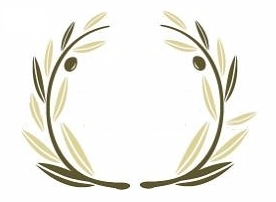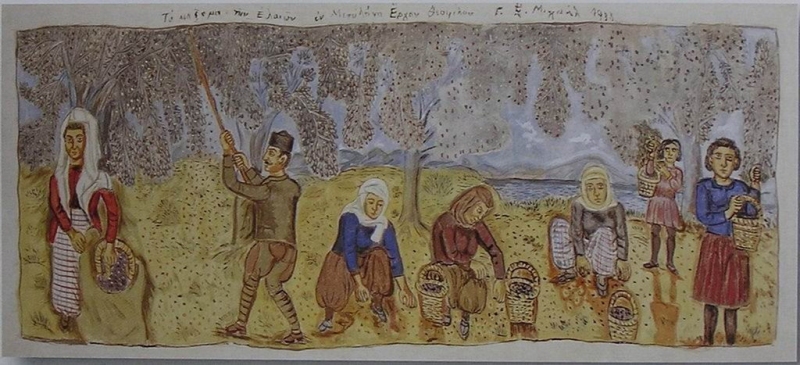History
 The olive tree first appeared thousands of years ago in the Mediterranean basin, and from there it spread to all neighbouring countries.
The olive tree first appeared thousands of years ago in the Mediterranean basin, and from there it spread to all neighbouring countries.
It is believed that the collection of both edible and wild olives was practiced in the Aegean area ever since the Neolithic Age. This collection is called Olea europaea oleaster. The oldest samples of olive pollen so far discovered can be dated to the end of the Neolithic Age and they come from Crete and Boeotia.
50000-year-old fossilized leaves of the European Olive Tree were discovered in the islands of:
- Nisyros,
- Cyme and
- Santorini.
According to ancient Greek mythology, the olive tree was a gift by the goddess Athena to the city of Athens, when a competition between her and the god Poseidon took place in order to decide on the city’s patronage. The legend says that Poseidon planted his trident in the sacred rock of the Acropolis creating a salt spring. This spring was later called the Sea of Erechtheus. When Athena struck the rock with her lance, an olive tree full of olive fruits sprung up. This was regarded as a promise of glory and prosperity for the city.
 The oldest examples of a systematic olive tree cultivation and olive oil production come from the eastern Mediterranean and, particularly, from Palestine.
The oldest examples of a systematic olive tree cultivation and olive oil production come from the eastern Mediterranean and, particularly, from Palestine.
The stone presses, which were discovered in the region of Haifa in Israel, are related to olive oil production. They are dated back to the 5th millennium BC.
In all likelihood, the Phoenicians were the first to disseminate olive tree cultivation in the Mediterranean basin and also the first to produce olive oil by using the same technique as the Egyptians for the extraction of oil from seeds.
The clay tablets found in the Mycenaean palaces of Crete and mainland Greece provide us with information about olive tree cultivation and olive oil distribution. These tablets are written in the first Hellenic writing, a syllabary conventionally named Linear B.
 Since the very ancient years, the olive tree appears in myths, depictions and traditions of those countries where it grows. The olive tree was always a symbol of:
Since the very ancient years, the olive tree appears in myths, depictions and traditions of those countries where it grows. The olive tree was always a symbol of:
- prosperity,
- fertility and
- peace.
The social importance of the olive tree can be demonstrated by the fact that in ancient Greece the winners of the Olympic Games were crowned with an olive wreath and rewarded with olive oil.
From an early time, our people have been associated with the olive tree and olive oil.
 They were both connected with many aspects of life and constituted an integral part of the Greek:
They were both connected with many aspects of life and constituted an integral part of the Greek:
- social,
- economic and
- artistic expression.
Soon, the Greeks discovered the therapeutic and cosmetic properties of olive oil, which is still used in many beauty products even today.
The olive tree is considered a blessed tree and every part of it can be exploited. Today, apart from its fruit, wood and leaves, the olive processing waste can be also used for industrial purposes.
 The olive tree is an evergreen and perennial tree. The cultivation of the olive tree is limited to the two temperate zones and especially to the Mediterranean basin, which holds 98% of the worldwide plant potential and production. Cultivating olive trees is not demanding and this is why they can survive even in particularly inaccessible areas.
The olive tree is an evergreen and perennial tree. The cultivation of the olive tree is limited to the two temperate zones and especially to the Mediterranean basin, which holds 98% of the worldwide plant potential and production. Cultivating olive trees is not demanding and this is why they can survive even in particularly inaccessible areas.
The European olive tree (the olive tree which produces olive oil) has many varieties. There are about 130 varieties of olive trees with 50 of them being the most well known. Some of these varieties are the result of a long process of development and adaptation to the microclimates where they were planted, whereas other species are the result of laboratory developments. Depending on the variety of the tree, olives can be categorized as small, medium and large caliber. Moreover, there are also ornamental olive trees.
If you deconstruct Greece, you will in the end see an olive tree, a grapevine, and a boat remain. That is, with as much, you reconstruct her.
The olive tree is surely the richest gift of Heaven.
